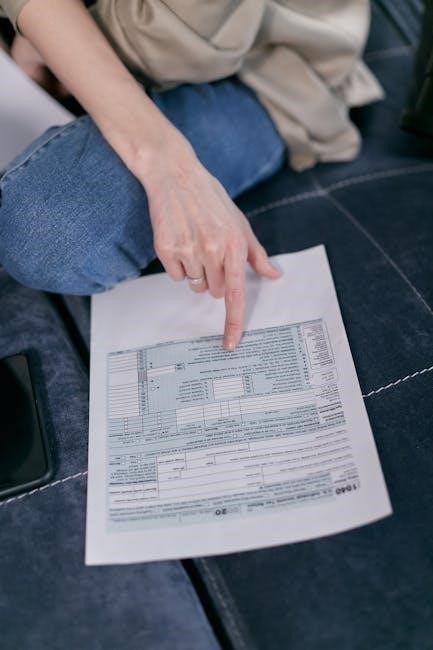nj cbt 100 instructions 2022

nj cbt 100 instructions 2022
Overview of NJ CBT-100 Instructions 2022
The NJ CBT-100 Instructions 2022 provide guidance for corporations filing their business tax returns in New Jersey․ It outlines requirements, forms, and filing procedures for tax year 2022․
Corporations must adhere to updated tax rates, electronic filing mandates, and payment deadlines․ The instructions also cover S corporations and unitary businesses, ensuring compliance with state regulations․
What is the NJ CBT-100 Form?
The NJ CBT-100 Form is the official Corporation Business Tax Return for businesses operating in New Jersey․ It is used to report income, calculate tax liability, and claim applicable credits․ The form applies to corporations, including S corporations and unitary businesses, ensuring compliance with state tax regulations․ It must be filed annually, with specific instructions provided for accurate completion and submission․ Electronic filing is mandatory for most entities, streamlining the process and reducing errors․
- Reports business income and expenses․
- Calculates state tax liability․
- Allows for credits and deductions․
The CBT-100 is essential for maintaining tax compliance in New Jersey․
Who Needs to File the NJ CBT-100?
The NJ CBT-100 must be filed by corporations operating in New Jersey, including domestic corporations and foreign corporations conducting business within the state․ S corporations and unitary businesses file separate forms (CBT-100S and CBT-100U, respectively)․ The form is mandatory for entities with nexus in New Jersey, ensuring compliance with state tax laws․ Corporations must accurately report income, deductions, and credits to determine their tax liability․ Failure to file may result in penalties and interest․

Key Forms and Schedules for NJ CBT-100
The NJ CBT-100 requires several key forms and schedules, including CBT-100 for corporations, CBT-100S for S corporations, and CBT-100U for unitary businesses․ Additional schedules may be necessary for detailed reporting․
CBT-100 Form: Corporation Business Tax Return
The CBT-100 is the standard form for corporations to report their New Jersey Corporation Business Tax․ It details income, deductions, and tax liability, ensuring compliance with state tax laws․ Corporations must include federal tax returns, schedules, and additional documentation as required․ The form calculates taxable income based on federal returns, adapted to New Jersey-specific rules․ Electronic filing is mandated for accuracy and efficiency․ Proper completion ensures adherence to payment deadlines and avoids penalties․ Accurate reporting is crucial for compliance and audit preparedness․
CBT-100S Form: S Corporation Business Tax Return
The CBT-100S is designated for S corporations operating in New Jersey․ It requires reporting of shareholders’ share of income, deductions, and credits․ Corporations must include Schedule K and Schedule K-1, detailing each shareholder’s allocation․ The form also addresses specific tax credits and deductions applicable to S corporations․ Line 1 specifies shareholders’ allocated income/loss from Schedule K․ The form integrates federal data but applies New Jersey-specific tax rules․ A refundable credit for taxes paid is now available, benefiting eligible S corporations․ Electronic filing is mandatory for accurate submission․
CBT-100U Form: Unitary Business Tax Return
The CBT-100U is for corporations filing as part of a unitary group under New Jersey’s Corporation Business Tax․ It applies to taxable years ending on or after July 2022 through June 2023․ Corporations filing CBT-100U must also submit the standard CBT-100 for the same tax year․ A separate CBT-100U is required for each unitary business․ Foreign corporations with New Jersey partnerships must file this form to claim taxes paid on their behalf, ensuring compliance with state tax regulations and proper allocation of income․
Filing Instructions for NJ CBT-100 in 2022
For tax year 2022, corporations must file the NJ CBT-100 electronically through the Division of Revenue and Enterprise Services․ Ensure all required schedules and documents are included to avoid delays․ Payments must be made electronically, and extensions can be requested using Form CBT-200-T․ Follow the detailed instructions provided by the New Jersey Department of Taxation for accurate completion and submission of the return, ensuring compliance with all state tax regulations․
Step-by-Step Guide to Completing the Form
To complete the NJ CBT-100, start by gathering all necessary documents, including federal tax returns and financial statements․ Begin with basic corporate information, such as the Employer Identification Number and business address․ Calculate total income, deductions, and credits, ensuring accuracy․ Complete all applicable schedules, such as Schedule A for income and Schedule B for deductions․ Report any losses or prior year adjustments․ Calculate tax liability, apply credits, and determine payment or refund amounts․ Sign and date the form, then submit electronically with required payments․ Follow the 2022 instructions for specific guidance on each section․
Required Documents and Information
To complete the NJ CBT-100, you need federal tax returns (e․g․, Form 1120), financial statements, and Schedule K (for S corporations)․ Include Schedule A for income reconciliation, Schedule B for deductions, and Schedule A-2 for apportionment․ Provide documentation for credits, such as the Manufacturing Equipment and Employment Investment Credit․ Attach Federal Form 1120 and related schedules, as well as any amended returns․ Ensure all income, deductions, and credits align with federal filings․ Organize records for accurate reporting and compliance with 2022 requirements․
Calculating Tax Liability and Credits
To calculate tax liability, start with federal taxable income, then reconcile it to New Jersey income using Schedule A․ Apply the applicable tax rate based on income brackets․ Subtract allowed credits, such as the Manufacturing Equipment and Employment Investment Credit․ Ensure accurate reporting of deductions and credits to avoid overpayment or underpayment․ Verify calculations using Schedule K for S corporations and Schedule A-2 for apportionment․ Double-check all figures to ensure compliance with 2022 NJ CBT-100 requirements and avoid potential audit issues․

Important Changes in NJ CBT-100 for 2022
The 2022 NJ CBT-100 introduced updated tax rates, electronic filing mandates, and new credits for manufacturing and employment investments․ These changes aim to modernize tax compliance and incentives․
Updates to Tax Rates and Brackets
The 2022 NJ CBT-100 instructions include updated tax rates and brackets to reflect changes in state tax policies․ Corporations now face a reduced rate of 6․5% on taxable income, while S corporations benefit from a 5% rate․ These adjustments aim to incentivize business growth and investment in New Jersey․ Additionally, the brackets have been revised to align with economic conditions, ensuring fair taxation across different income levels․ These updates apply to tax years ending on or after July 2022 through June 2023․
New Filing Requirements for S Corporations
For tax year 2022, S corporations in New Jersey must adhere to updated filing requirements․ The CBT-100S form now allows S corporations to claim a refundable credit for taxes paid on behalf of shareholders․ Additionally, corporations can continue to claim the existing credit for taxes paid, providing flexibility․ These changes aim to simplify compliance while ensuring accurate reporting of pass-through income․ Proper documentation, including federal forms and schedules, must be included to support the filing․
Filing and Payment Requirements
Electronic filing is mandatory for NJ CBT-100 returns․ Payments must be made electronically via E-Check or ACH․ Ensure timely submissions to avoid penalties and interest charges․
Electronic Filing Mandate
The NJ CBT-100 requires electronic filing for all corporations and S corporations․ Payments must be made via E-Check or ACH through the Division of Revenue and Enterprise Services (DORES)․ Electronic filing ensures accuracy and faster processing․ Failure to comply may result in penalties and interest․ This mandate applies to tax years beginning on or after January 1, 2016․ Visit the DORES website for detailed instructions and support with electronic submissions․
Payment Options and Deadlines
Corporations can pay taxes via E-Check, ACH, or credit card through the DORES website․ Payments must accompany the filed return․ Extensions do not extend the payment due date․ The deadline for filing and payment is the 15th day of the 4th month after the tax year ends․ Estimated taxes must be paid quarterly, with due dates in April, June, September, and January․ Late payments incur penalties and interest․ Schedule multiple payments by E-Check for convenience․ Visit the DORES website for detailed payment instructions and deadlines․
Common Mistakes to Avoid
Common errors include incorrect income reporting, deductions, and schedule completion․ Missing deadlines and incorrect filings can lead to penalties․ Ensure accuracy to avoid issues․
Errors in Reporting Income and Deductions
Accurate reporting of income and deductions is critical․ Common mistakes include incorrect allocation of income, improper classification of receipts, and overstated or understated deductions․ Ensure all figures align with federal returns and New Jersey-specific rules․ Misreporting can lead to audits and penalties;
Verify that deductions comply with state regulations, avoiding disallowed expenses․ Properly document all items to support claims, reducing the risk of errors and ensuring compliance with filing requirements․
Incorrect Completion of Schedules
Errors in completing schedules can delay processing․ Ensure Schedule A, A-2, and A-3 are accurately filled, aligning with federal data․ Misreporting income or deductions across schedules is common․ Verify that all items are correctly categorized and totaled․ Failure to complete mandatory sections or providing inconsistent data can trigger audits․
Double-check calculations and ensure compliance with New Jersey-specific rules․ Incomplete or incorrect schedules may result in processing delays or penalties․ Always refer to the 2022 NJ CBT-100 Instructions for guidance on proper completion and submission requirements․

Audit Preparation and Compliance
Maintain accurate records and ensure compliance with New Jersey tax regulations․ Organize documents to support tax filings and prepare for potential audits by verifying data accuracy and adherence to state guidelines․
Document Retention and Record-Keeping
Accurate record-keeping is essential for compliance with NJ CBT-100 requirements․ Maintain detailed financial statements, tax returns, and supporting documents for at least five years․ Ensure all records, including receipts, invoices, and ledgers, are organized and accessible for audit purposes․ Electronic storage is acceptable if records are clear and retrievable․ Proper documentation helps verify income, deductions, and credits, reducing the risk of audit issues․ Retain federal and state correspondence to support filings and adjustments made during tax preparation․
Understanding Audit Triggers
Several factors can trigger an audit when filing the NJ CBT-100․ Inaccuracies in reported income, deductions, or credits often raise red flags․ Large or frequent amendments to returns may also prompt scrutiny․ Incomplete or inconsistent information across schedules and forms can lead to audits․ Additionally, significant deviations from industry norms or prior-year filings may attract attention․ Maintaining precise records and ensuring accuracy in submissions helps mitigate these risks․ Be aware of these triggers to avoid unnecessary scrutiny and ensure compliance with state tax regulations․

Extensions and Amended Returns
Corporations may file for an extension using Form CBT-200-T․ Amended returns require a separate filing with updated information․ Ensure accuracy to avoid delays or penalties․
How to File for an Extension
To request an extension for filing the NJ CBT-100, corporations must submit Form CBT-200-T by the original deadline․ This form allows a six-month extension for filing the return, but not for paying taxes․ The extension must be filed electronically through the New Jersey Division of Revenue and Enterprise Services․ Payments can be made via e-check or credit card․ Note that filing an extension does not extend the deadline for paying taxes, and penalties may apply for late payment․ Ensure to review the 2022 instructions for specific details and consult a tax professional if needed․
Amending a Previously Filed Return
To amend a previously filed NJ CBT-100 return, corporations must complete and submit Form CBT-100 with the “Amended Return” box checked․ Include a detailed explanation of changes and supporting documents, such as corrected schedules or federal returns․ The amended return must be filed electronically through the New Jersey Division of Revenue and Enterprise Services․ Ensure to address any discrepancies in income, deductions, or credits․ Consult the 2022 instructions for specific guidance on amending and required documentation․
Resources and Support
The State of New Jersey provides official guidance and support for CBT-100 filings through its Division of Revenue and Enterprise Services website and customer service․
Consult professional tax advisors or use online tools like DocHub for assistance with form preparation and submission to ensure compliance with 2022 instructions․
Official State of New Jersey Guidance
The State of New Jersey provides comprehensive guidance for CBT-100 filings through its official Division of Revenue and Enterprise Services website․ Corporations can access detailed instructions, forms, and FAQs for tax year 2022․ The website offers step-by-step guides for completing the CBT-100, CBT-100S, and CBT-100U forms, ensuring compliance with updated tax rates and electronic filing requirements․ Additional resources include tax rate schedules and payment deadlines, helping businesses navigate the filing process efficiently and accurately․
Professional Assistance and Consultation
Consulting a tax professional or legal expert is highly recommended for accurate CBT-100 preparation․ They can guide corporations through complex calculations, ensuring compliance with New Jersey tax laws․ Additionally, online platforms like DocHub offer tools for editing and signing forms, while the state provides resources for electronic filing․ Professional assistance helps avoid errors, ensuring timely and correct submissions of CBT-100, CBT-100S, and CBT-100U forms, adhering to all compliance requirements and deadlines․
Understanding the NJ CBT-100 instructions 2022 is essential for corporations to ensure accurate and timely filing․ Adhering to electronic filing mandates and payment deadlines is crucial for compliance․ The State of New Jersey provides detailed resources, but consulting tax professionals can help navigate complexities and avoid costly errors․ Staying informed and seeking assistance ensures adherence to all requirements, facilitating a smooth filing process and maintaining compliance with state tax regulations․